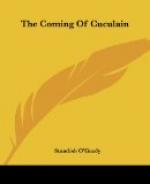“Yea, he is coming.
He draweth nigh.
Verily It is he whom I behold—
The predicted one—the
child of many prophecies—
Chief flower of the Branch
that is over all—
The mainstay of Emaiti Macha—the
battle-prop of the Ultonians—
The torch of the valour and
chivalry of the North—
The star that is to shine
for ever upon the forehead of the Gael.
It is he who slumbers upon
Slieve Fuad—
The child who is like a star—
Like a star upon Slieve Fuad.
There is a light around him
never kindled at the hearth of Lu,
The Grey of Macha keeps watch
and ward for him,
[Footnote:
Madia’s celebrated grey war-steed. The meaning
of
the allusion will be understood presently.]
And the whole mountain is
filled with the Tuatha de Danan.”
[Footnote:
These were the gods of the pagan Irish.
Tuatha=nations,
De=gods, Danan=of Dana. So it means
the
god nations sprung from Dana also called Ana.
She
is
referred to in an ancient Irish Dictionary as Mater
deorurn
Hibernensium.]
Then his vision passed from the Druid, he raised up his long white hands and gave thanks to the high gods of Erin that he had lived to see this day.
When Cathvah had made an end of speaking there was a great silence in the hall.
CHAPTER II
THE BOYS OF THE ULTONIANS
“And dear the school-boy spot
We ne’er forget though there we are forgot.”
Byron.
“There were his young barbarians all at play.”
Byron.
In the morning Fergus Mac Roy said to the young king, “What shall we do this day, O Concobar? Shall we lead forth our sweet-voiced hounds into the woods and rouse the wild boar from his lair, and chase the swift deer, or shall we drive afar in our chariots and visit one of our subject kings and take his tribute as hospitality, which, according to thee, wise youth, is the best, for it is agreeable to ourselves and not displeasing to the man that is tributary.”
“Nay,” said Concobar, “let us wait and watch this day. Hast thou forgotten the words of Cathvah?”
“Truly, in a manner I had,” said Fergus, “for I never much regarded, the race of seers, or deemed the birds more than pleasant songsters, and the stars as a fair spectacle, or druidic instruments aught but toys.”
“Let us play at chess on the lawn of the dun,” said the king, “while our boys exercise themselves at hurling on the green.”
“It is agreeable to me,” said Fergus, “though well thou knowest, dear foster-son, that I am not thy match at the game.”
What the champion said was true, for in royal wisdom the king far excelled his foster-father, and that was the reason why Fergus had abdicated the supreme captainship of the Red Branch in favour of Concobar, for though his heart was great his understanding was not fine and acute like the understanding of his foster-son.




